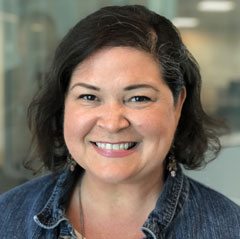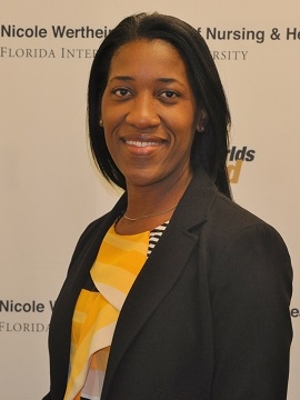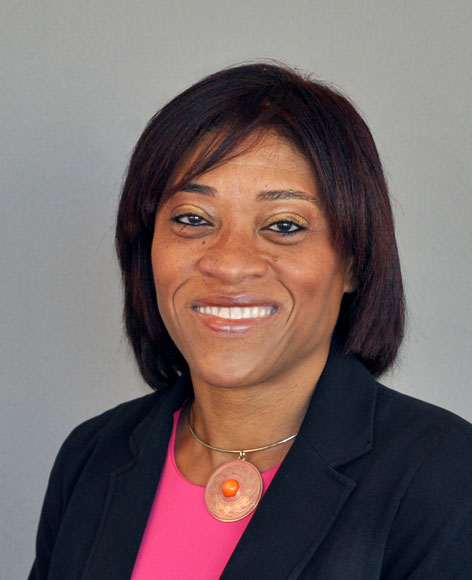Nursing professors and sisters facilitate FIU’s COVID-19 vaccine site

May 17, 2021, 12:00 PM.
article key points
Yhovana and Vanessa Gordon share their experience and thoughts on nursing, disaster management and COVID-19.
Sisters Yhovana and Vanessa Gordon seem to be tied at the hip. They’re not twins, are sheepish about revealing who is older, but are proud to declare their love for FIU and its community. They have a lot in common. They are FIU alumnae and completed their Bachelor of Science in Nursing together, both are FIU nursing professors, they each have their doctorate in nursing, and both were enlisted to help the university team assembled for FIU’s COVID-19 vaccination site.
“At FIU, we’re a package deal,” laughs Yhovana who recounts how Vanessa’s involvement with the Herbert Wertheim College of Medicine and the Nicole Wertheim College of Nursing & Health Sciences’s COVID-19 testing site turned into an opportunity for both of them to help the university and community with vaccines and engagement for the university.
“I love pulling up my sleeves and doing my part for the community,” says Yhovana, who stepped into her position as the associate dean of academic affairs at the College of Nursing only months before the pandemic.
Premonition
Newly in her position, Yhovana says she began having 3 a.m. thoughts about the need for forward-thinking courses to enhance the nursing program. In response to a university call for more micro-credentials embedded in FIU’s degrees, Yhovana is developing a program to infuse disaster management instruction into the bachelor’s degree in nursing (RN to BSN) curricula.
Having experienced Hurricane Irma firsthand, she saw the need for instruction and began augmenting the RN-BSN program in support of the university’s community. The aim is to follow up with the development and implementation of a micro-credential badge embedded in the RN-BSN curricula.
Putting knowledge to work

When the pandemic began to take hold, Yhovana’s infusion of community engagement and emergency response in the advanced nursing and RN-BSN curricula offered students a great head start, she says. Little did she know she would also, with her sister, be putting her educational plans into practical use so quickly.
“In early March 2020, we were called into a meeting with the Department of Health, the dean and the College of Medicine. We had no idea what the meeting was, but we soon realized that this is our calling—we were ready to serve,” recalls Vanessa who is the director of clinical education for the university’s graduate nursing program.
The sisters are in close collaboration with the university vaccine site team and have delivered more than 2,000 doses. They even found ways to expand the number of FIU community members to receive vaccines through the use of the additional dose available in some vials.
Educating people
During the morning briefings at the vaccination site, Yhovana and Vanessa went over the concerns heard from patients.

“People were scared to get the second dose,” recounts Yhovana who stresses that educating people is important to dispel fears. This is quintessential in emergency management. The vaccination staff provided evidence-based advice like what to do if you develop a fever, and how long it should last but, above all, they were transparent about the side effects and the reality that the pandemic is not over yet. In any disaster, transparency is key, emphasizes Yhovana.
Vanessa notes that one of the top reasons people received the vaccine is because they want to travel again. In addition, many patients wanted to throw their masks away immediately after getting their second vaccination shot.
“They took off their masks like a celebration, taking selfies, but we explained that the waiting period is crucial and handed them new masks to walk out with,” states Yhovana.
One step closer
The biggest misconception about the vaccine is that it will be the “magic tool” to fight the spread of COVID-19.
“We told them, ‘remember, you have the vaccine, but it does not replace your mask, you still have to social distance, wash hands and wear your mask as the vaccine is not completely effective until two weeks after your second dose—until immunity is achieved, you could still become sick, and you may still be able to spread COVID-19,’” Yhovana describes.
“We are all tired of wearing our masks, but it’s the one thing that is helping keep us safe,” offers Vanessa. “We are one step closer to a new normal that we recognize as more normal, so we need not lose hope and keep working together.”
